5+ Warning Signs Of A Sick Chicken
This list of signs of a sick chicken will be a helpful way to raise a healthier flock. Being a livestock owner can bring out some unique skills. Investigator being at the top. I was totally unaware of how much Sherlocking (spell check refuses to admit that is a word) I would have to do.
Another great resource to have for raising chickens that are happy and healthy from day one.
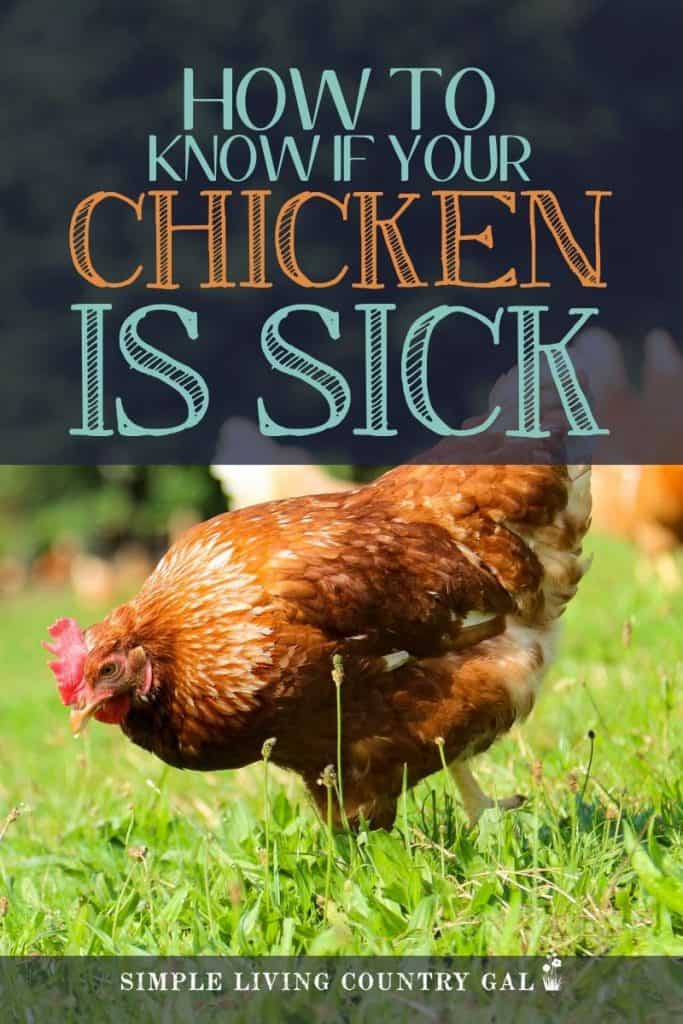
As with most birds, chickens tend to mask their symptoms well beyond treatment time, and many times an owner may not realize there is an issue until it is too late. That is why it is important to know the signs of a sick or injured chicken to help you catch things early on.
Luckily, chickens do have several warning signs you can watch for. Things that you will want to be aware of, and yes, in the beginning, those signs will be subtle, but if you know what to look for, you can save yourself and your chicken from loads of heartache.
Just like with most of our animals, when you can catch a problem before it gets out of hand, you should have enough time to restore the health of not only that one hen but your entire flock.
Before we get started, I first want to mention the importance of having chickens that are used to being handled. This will help you to give care without causing additional stress.
How can I have chickens that don’t run from me?
The main way to raise chickens that are people-friendly is to touch them from day one. Pick your chicks up, talk to them, pet them, and hold them.
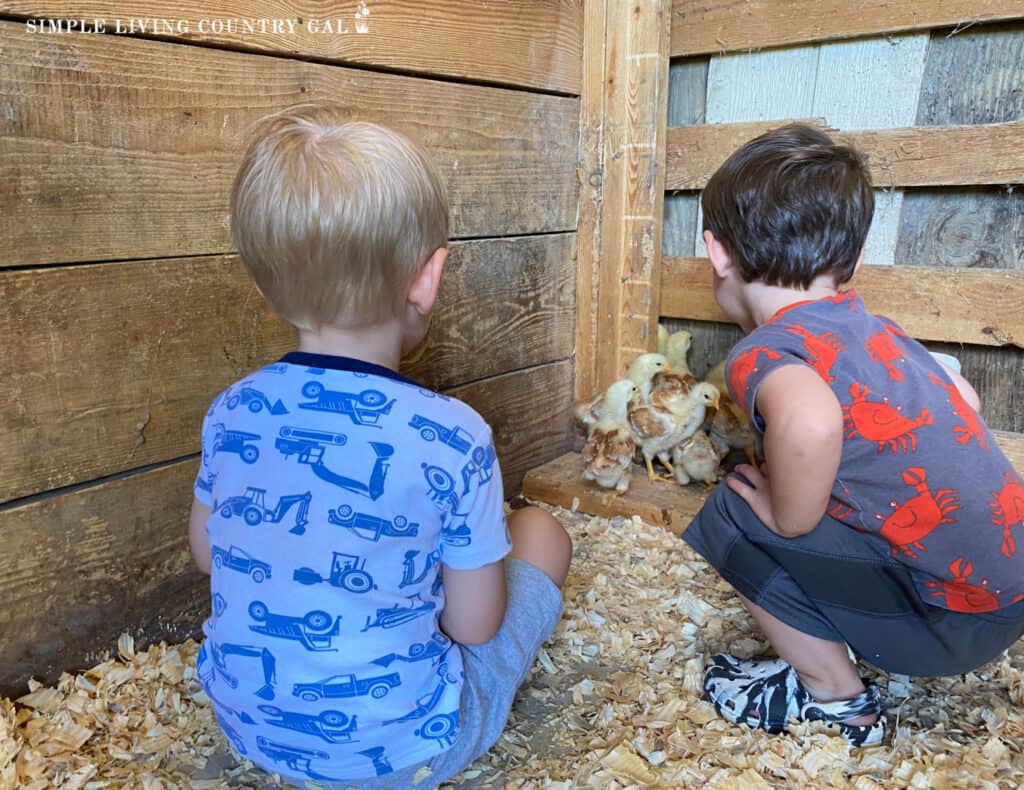
Get them used to your touch, your feel, your voice. Whenever you are able to hold your chicken, be sure to reinforce this behavior with treats and petting.
Be sure to grab the FREE Chicken Health Checklist below!
Warning Signs of a Sick Chicken
Have you ever felt a cold coming on? It’s like a little tap on your shoulder letting you know that sickness is on its way, and soon.
Yes, these hints are subtle, a tickle in your throat or a light throb in your head for example. If you can catch them early on, you will have time for pretreatment, so your upcoming cold will not be quite as severe.
We learn quickly what those subtle clues are so we can watch for them, and the same is true with our hens. As their caregivers, we will want to learn these subtle signs. This will help us give care more quickly and protect them, if needed, from the rest of the flock.
Sign #1 – Dull feathers with or without bald patches.
Dull feathers are easy to spot and can mean a few different things. If you have a hen or group of hens showing this symptom you may want to investigate further the possible cause.
Henpecking, external parasites, seasonal molting, or an illness should be first on your radar if you see dull or lackluster feathers. A healthy and happy hen will have shiny, thick feathers and be free of bald patches.
Why does my chicken have bald patches on her neck?
If you have a rooster in your flock, missing feathers, especially on the back and/or neck, can be from mating. Sometimes, a rooster can be rough when mounting the hens, and missing feathers with no other symptoms may be a result of this.
Roosters will use their beaks to hold onto the chicken by clamping down on their neck or back feathers.
To help, you can purchase one of these chicken aprons or chicken saddles to better protect your hens from injury from an over-eager rooster. These protectors are meant to give the rooster a place to hold onto, reducing the risk of damaged feathers.
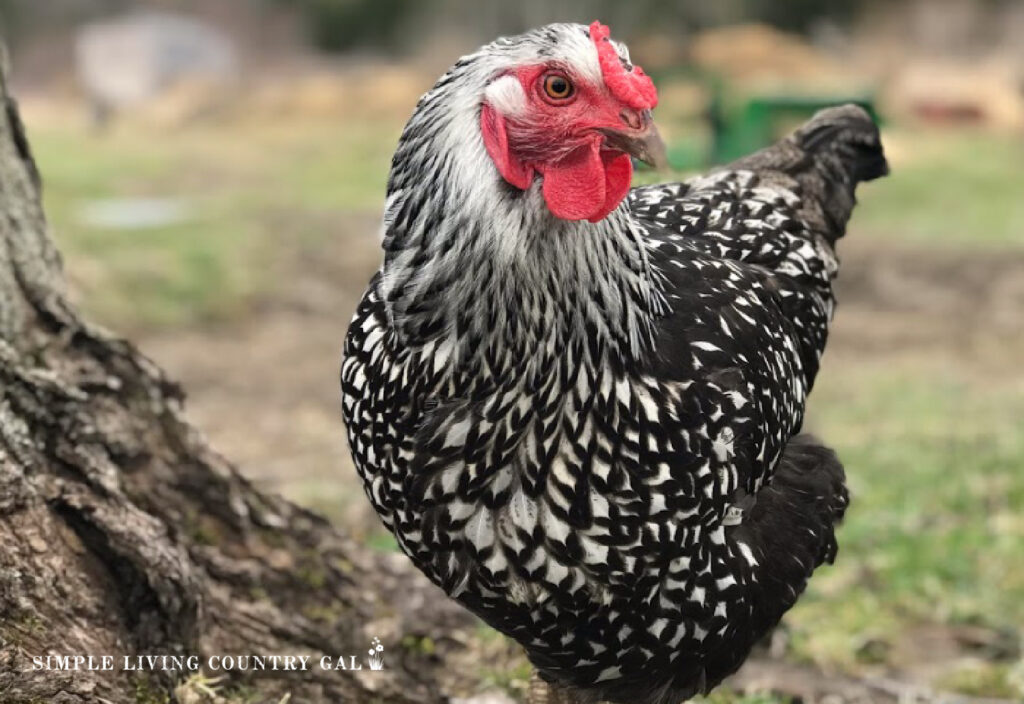
How to deal with henpecking
Watch the interactions of your chickens at feeding time. If you see lots of fighting, pushing, or squawking, then bullying might be the cause of this symptom.
Here are a few things you can do:
• Try putting out more than one feed source in the coop.
• Be sure you have enough room on the roost.
• Set up a few obstacles inside your chicken coop and chicken run to help bullied chickens get away from any aggressive hens.
Branches work the best for this. Not only will they provide lots of protection from hen pecking, but they will also give your hen leaves, bark, and bugs to search for.
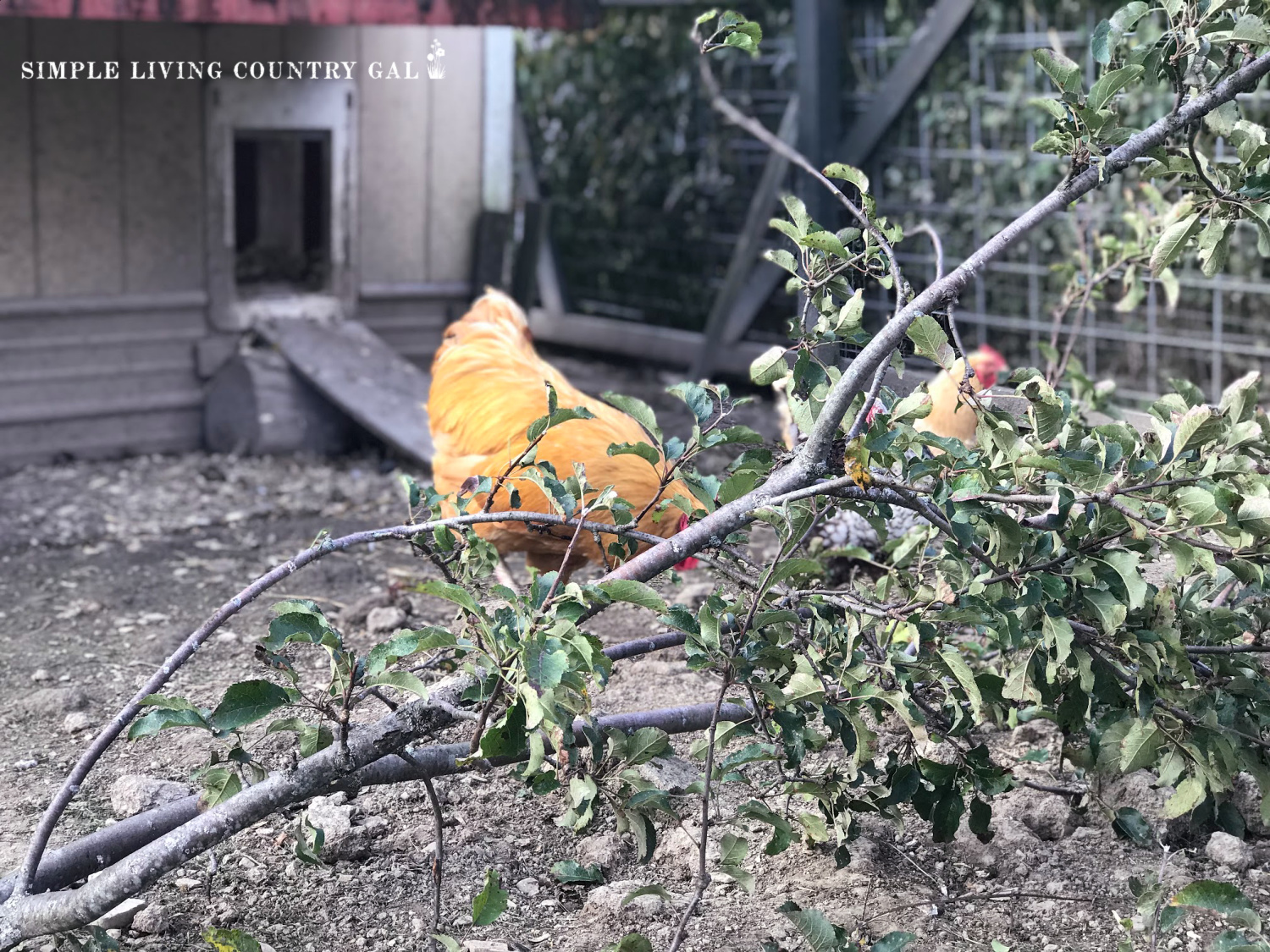
• Set up toys or treat feeders. Boredom is one of the top reasons hens begin pecking other chickens in a flock, so interactive tasks can help keep everyone happier.
12PCS Longer Chain Chicken Toys for Coop Accessories,Xylophone Swing Flexible Ladder String Bag Vegetable Fruits Skewer Mirror Grinding Stone Pecking for Hens Bird Parrot

More Chicken Aggression Resources:
Another reason for missing feathers on a chicken is seasonal molting. The first adult molt will usually occur at 16-17 months.
What is molting in a chicken?
Molting is when a chicken sheds its feathers and grows new ones, lasting approximately 6-8 weeks.
It usually occurs as the seasons get cooler and the days get shorter. Most chickens do not lay eggs during this time to help preserve the energy needed to regrow feathers.
This is something to keep in mind if you find one or more of your chickens slowing down or not laying eggs at all.
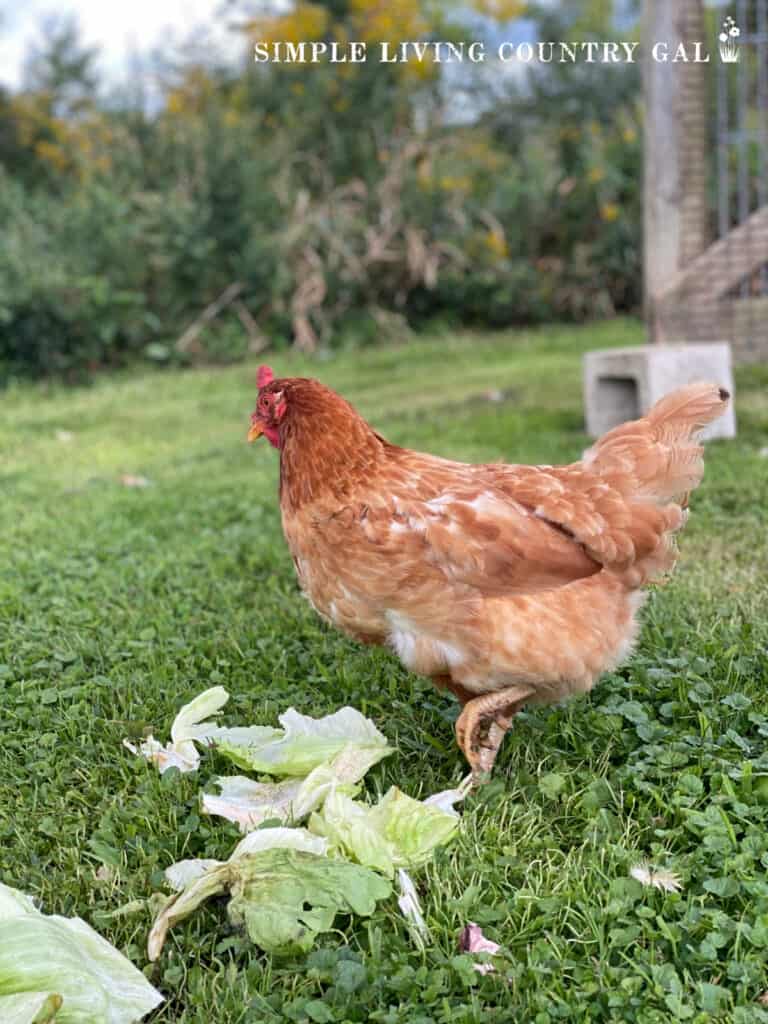
What if your chicken has parasites?
If you suspect parasites, you will most likely be dealing with lice or mites. The difference is that lice are more commonly found on the hen itself, whereas mites are usually found in the coop.
To deal with both situations, you will want to use the poultry dust that you can purchase at your local feed mill.
When dealing with parasites, natural dust is best if you can find it, like this natural poultry dust HERE.
Harris Diatomaceous Earth Food Grade, 5lb


Sign #2 – A dull comb and/or wattle.
A healthy chicken will have a beautiful bright pink or red comb and wattle. On older hens, the color may be a lighter pink, but this will still indicate a healthy bird.
If you see a comb or wattle that is dull, this may be a sign your chicken is sick and you will want to look for an underlying issue.
What is a comb and wattles on a chicken?
The comb and wattle are the extra skin above and below the head. Its purpose is to help with blood flow and allow the chicken to deal better with the heat of summer.
If you happen to have a breed of hen that is hardy in the hot months, then you may see a larger comb.
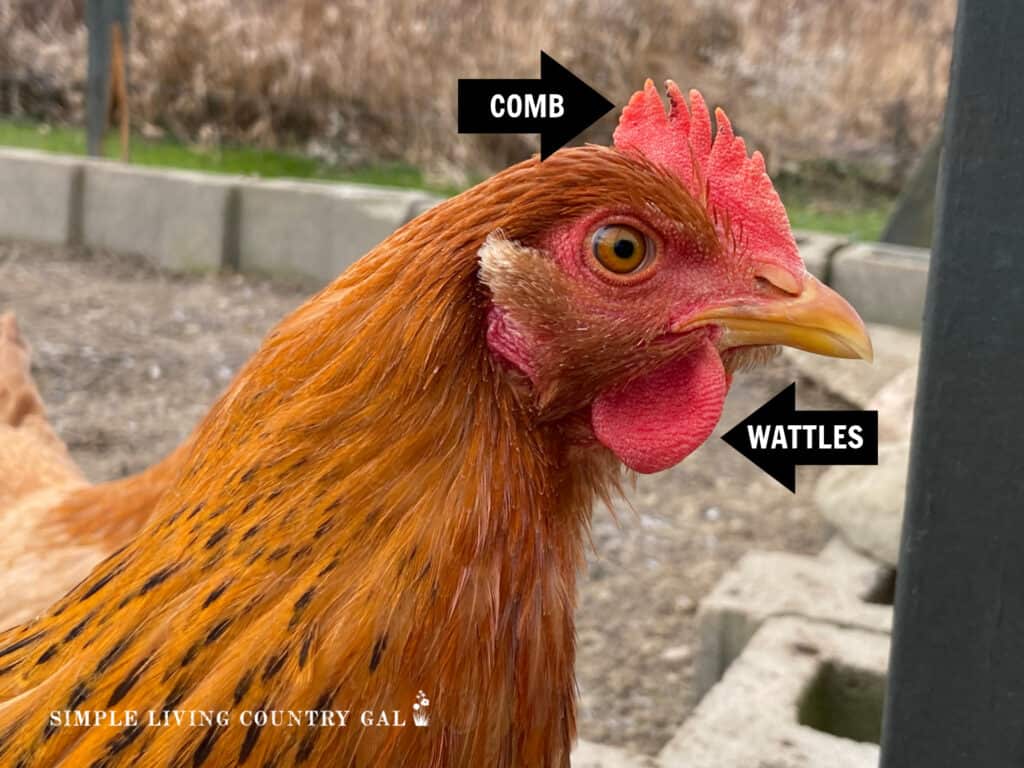
If you notice the color of your chicken’s comb or wattle is dull or grey and looks dried out, it is time to look further. Illness, poor diet, or overcrowded conditions can all lead to this result so you will need to dig a little deeper to find the root cause so you can more quickly correct it.
What to check first:
Stress can be the primary cause of comb and wattle issues. Watch how your hens interact when you close your coop up at night. If you see fighting for spots on your roosts, then overcrowding might be the issue. Be sure you have plenty of room on your roost to hold all of your chickens comfortably.
If you notice dull to grey or even black combs and wattles in the winter, then your coop may not be adequately protecting your flock from the cold weather. Luckily there are a few things you can do to fix this.
Apply Vaseline to the comb to protect against frostbite, and update your coop to keep out the wind and protect your flock more adequately when inside.
More Chicken Care Resources:
- HOW TO BUILD A BETTER CHICKEN ROOST
- CHICKEN PERCH OPTIONS
- HOW TO KEEP YOUR CHICKENS WARM IN THE WINTER WITHOUT ELECTRICITY
If none of the above reasons have solved this problem, diet is your next place to look. Be sure you are feeding your poultry with a high-quality chicken feed that contains nutrients specifically for chickens.
Sign #3 -Disinterest IN FOOD at feeding time
For me, one of the top warning signals with any of my animals that something is off is a loss of appetite.
If an animal is not eating or drinking, for that matter, something is seriously wrong. This is why I always recommend sticking around when you feed your chickens. Watch them. See who rushes up to you at feeding time and who stays back.
Observe who is eating and who is not. Now, with all that being said, just because a chicken is not eating on a particular day does not necessarily mean they are sick. It does, however, give you a clue if you see it occurring more than once.
What to check first:
Check the feed and water in your chicken coop. Is it free from debris such as dust, bedding, or manure?
• Is it free from pests? Yes, it’s true chickens like to eat bugs, but not dead ones that are floating in their water or dried-up bugs lying in their feed.
• Does the feed smell okay? If not you may have a bad batch and you will want to check the bag you are currently using.
If you find that all the answers are good, then move on and check your chicken.
• Does your hen feel warm? If yes, check immediately for heat stress in your hens. Remember, some chickens handle the heat better than others. If you see panting hens, you will want to offer them more water options.
By adding a few extra sources of water throughout your coop and run, you can quickly correct this issue in your flock.
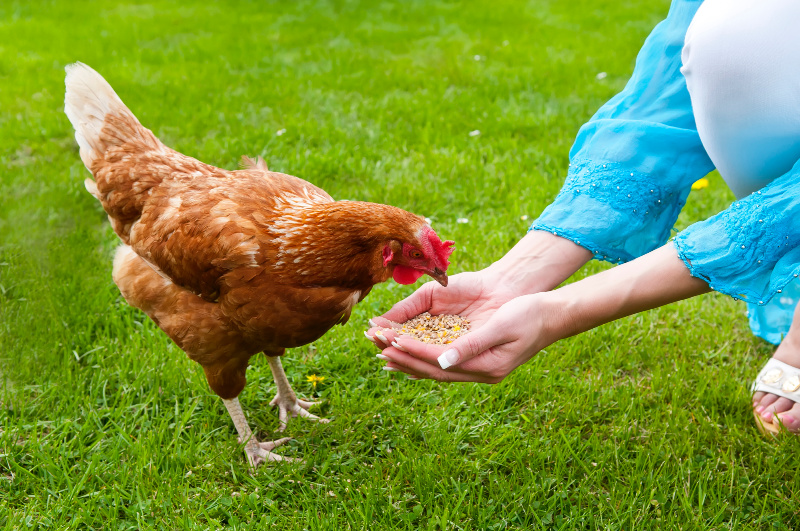
• How does she feel? I would also suggest routinely touching and feeling your hens with your hands and checking their body condition. Many times, feathers can mask weight issues. If you feel your hen is underweight, then you can be sure this symptom has been going on for some time.
• How does she look? Check her comb, feathers, and skin for any other clues as to what may be wrong.
• How is her manure? Check her poo to be sure it is healthy and not slimy, overly smelly, or too watery. You can send in a sample to your vet if you suspect worms. This will help you better determine what is causing the no-eating symptom.
Sign #4 – Coughing or raspy breathing.
Although this is a late-term warning sign of a sick chicken, the good news is that it is not always a death sentence. I have had coughing hens before that recovered completely and were able to return to back the flock.
The trick with coughs is to act fast to first save your hen and second keep any possible contagious illnesses from the rest of your flock.
What to check first:
• Look at the condition of your chicken coop. Is there adequate airflow? Are the walls covered in dust?
• When was the last time you added fresh bedding? Sometimes, a cough can be simply a reaction to a dirty coop; if there are no other symptoms, clean out the chicken coop and see if that helps.
• Check the bedding in your coop as well. Is it wet or moist? Both of these conditions can cause your chickens to cough from the ammonia smell that is given off by wet bedding. Remove the wet bedding and replace it with a fresh layer to see if this helps.
If, after fixing any issues, you find your chicken is still coughing, you will need to remove her from the coop. Separate your sick chicken until you can find out what is making her cough.
This will keep any illness from spreading throughout your entire flock. If you do not have a place to keep her separate, you can use a small dog crate as we do. This works remarkably well and has saved many hens in our flock.
If you do not have a dog crate, you can turn a large, sturdy box into a DIY chicken sick crate.
DIY Chicken Sick Crate:
- Cut a hole in the front and back to allow for good airflow.
- Attach chicken wire or mesh netting over the holes you just cut out.
- Put in a layer of bedding and a place for your chicken to eat and drink with room to rest as needed.
- Keep the box near the coop, if possible, so they can hear the other chickens. This will help them to recover more quickly.
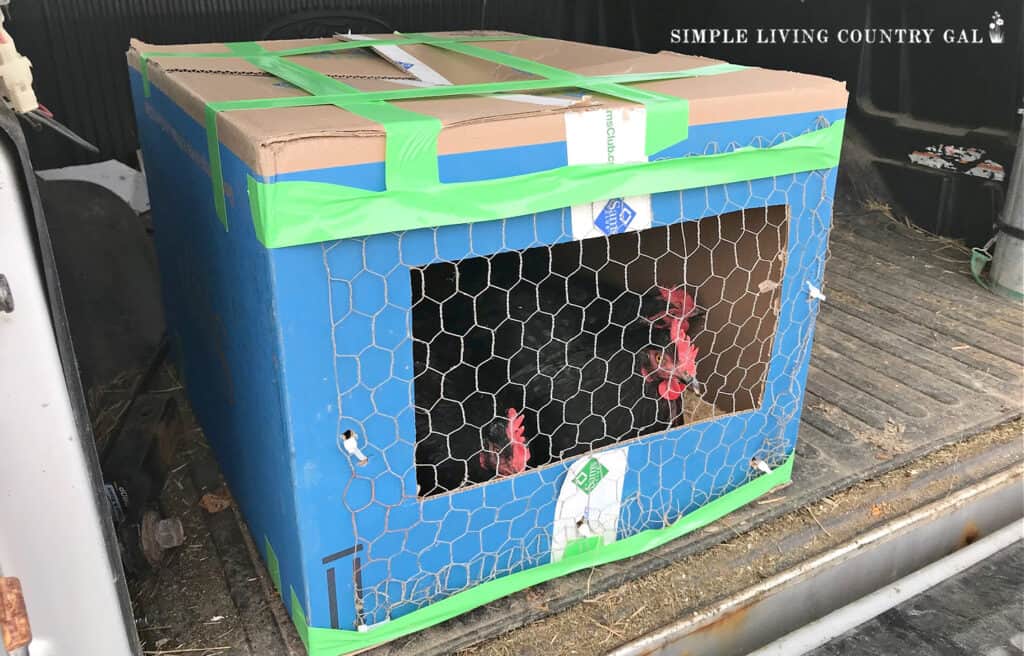
READ: WHAT TO DO IF YOU HAVE A SICK CHICKEN
If you see your chicken’s cough is wet or sounds raspy and is accompanied by a runny nose, then there is a good chance your chicken has pneumonia or CRD- Chronic Respiratory Disease.
Both of these conditions can be life-threatening and spread throughout your flock. It is important to contact a vet right away so you can get antibiotics to treat these conditions.
Please know that not all vets will treat chickens in the office; many will, however, help you over the phone, giving you steps on how to treat your flock.
Sign # 5 – A Dirty back end
This one is easier to see on some birds than others. A few years ago, I had a flock of all Black Star Hens. These hens are solid black-feathered chickens, and unless the mess on their back end was light-colored, I could very easily miss it. For that reason, I needed to check my coop and run at every feeding, looking at the ground and checking out droppings.
By inspecting my chicken’s poo routinely, I can catch any parasite problems before they become widespread.
Runny is normal for some hens from time to time, but if it is different from normal, you will want to check it out. Different as in extremely watery, slimy, foamy, or having an overly foul odor. These are all clues you will want to take note of.
HULX Super Green 10 CC. Rooster Booster Health Care Protection, Quickly Recover Chicken Rooster from Sick, Heal Wounds Pain After Fighting Gamecocks, Recovery Energy Increase Immunity Poultry & Bird

What to check first:
• If you see a change in the color, texture, or odor of your hen’s droppings, check their diet first. Did you give spoiled or rotten produce by chance? What about something completely new to their diet, like a feed change?
• Is their water cleaned and freshened every single day? Are there rodent droppings in their feed that they may be ingesting on accident?
If you can eliminate these causes and find that you still have an issue with runny or watery feces, you will want to do a fecal test for worms to determine your next step.
• The same is true if you see blood. This is another indication of a medical problem and would need to be discussed with a vet. If you do think you are seeing blood take a closer look first.
Sometimes food can trigger red in manure that looks like blood but isn’t. To be certain, look closely and use a stick or twig to move things around a bit.
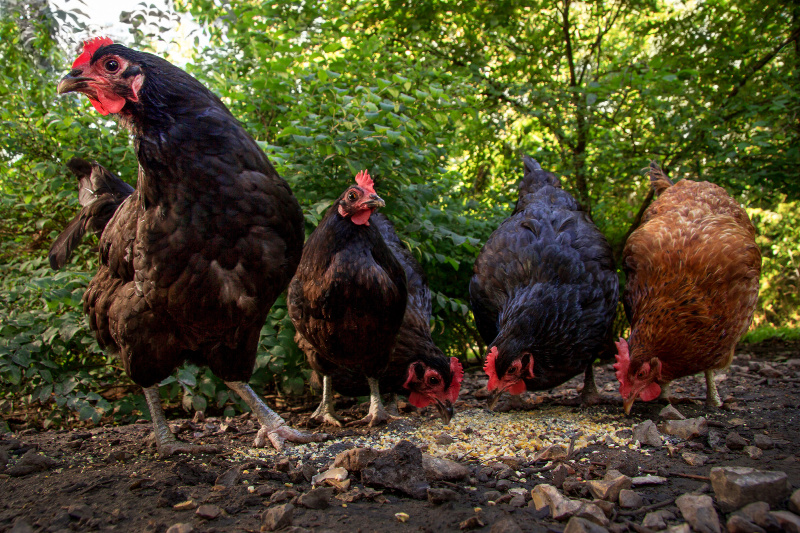
Sign #6 – A Hunched up Hen
If you notice one of your gals is hunched up, something is definitely wrong. Hunching means she is either in pain, sick, or bound up with an egg. Egg bound means your hen has an egg stuck in her oviduct, and a call to your vet is warranted.
Usually, my hunched-up hens are moving pretty slowly or not at all, so they are a bit easier to spot in the flock.
What to check first:
• Pick up your hen and check for injuries; if you find one, remove her and treat her. Next, check her vent. Make sure she is not clogged or injured there. You are looking for signs of a stuck egg, which can kill a bird quickly.
• If you find no injury or vent issue, remove the hen for a few days and monitor her. Wait to see if she gives any other clues that will help you to treat her.
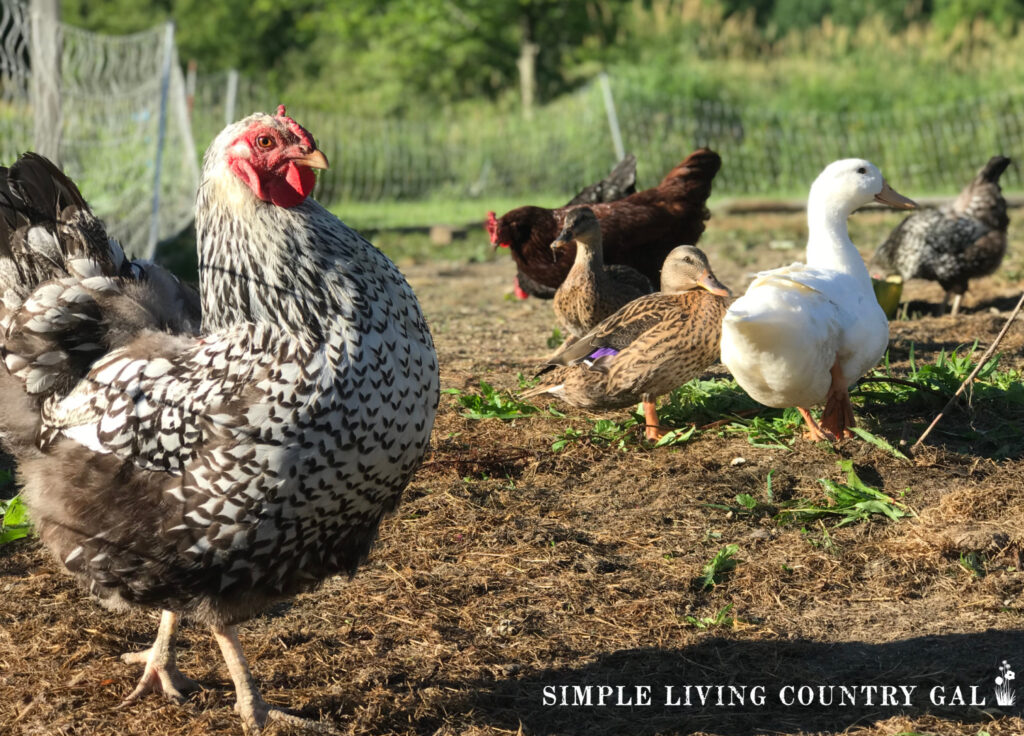
What if your chicken has more than one symptom?
More often than not, when I pick up a hen with one or more of these symptoms, I will see right away that she is thin and weak. Chickens, like most animals, will hide when they are sick, and unless you are watching daily, you will miss the early warning signs.
So, what do you do if you have a hen with one or more symptoms on this list?
I always err on the side of caution. I have found that isolating the hen is the best and most effective way to keep my flock healthy. Anything will do to house your sick gal, but if you need ideas, read my post What to Do If You Have a Sick Chicken to get tips.
Once you have your hen away from the flock, you can inspect her more closely and decide on a plan of attack. Choosing between home care and calling on a vet depends on the situation.
Watch your animals daily so you will notice any changes as soon as they happen. Catching things early can be the difference between life and death in livestock, so keep your eyes open. Knowing the signs of a sick chicken will keep you on top of things so you can stop a serious issue before it starts.

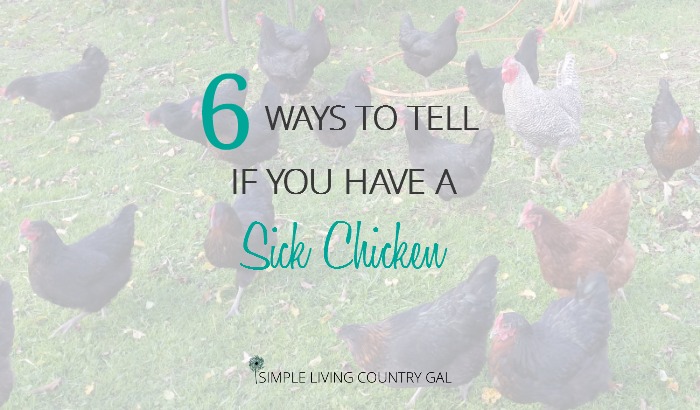







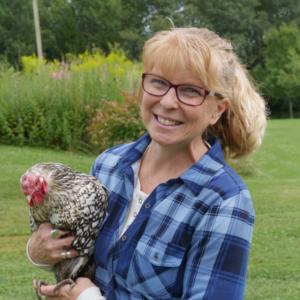



Taking care of chicks is extremely difficult, thank you for sharing the experience of caring for chicks for the best development. This will be very useful information to help me raise chickens better.
We notice our chicken has a lump on her chest about a week agot. It is about the size of a grapefruit. She is moving slowly. She drinks a lot of water, but is not eating much. Not sure what the lump is. Worried that she is in pain. Not sure what to do. She has always been our gentle chicken, and now that she is moving slowly the other chicken is picking on her. We only have the 2 chickens.
I am so sorry to be so long getting back to you, your comment got buried!!
I would contact a vet and have her looked at. A lump is not something to mess with. I hope I am not too late and your girl is doing okay!
Hi! One of our chickens who is the friendliest and healthiest chicken has been acting weird. She has been making an agitated noise, pacing in the run, and then hiding in the coop. Usually she is very active, loving to sit on our laps and peck in the grass. She hasn’t been showing signs of being egg bound and she has been eating. Currently she is hiding in the coop, scratching at the ground and laying in the chips. If you have any ideas of what could be bothering her and how to help her it would be greatly appreciated!
Hello, Genevieve,
How old is your hen? And how does her poo look? Is she eating and if so what are you feeding her?
Hopefully, we can figure out what is going on!
Tracy Lynn
our chicken has very runny poo, she is not eating or drinking. she is breathing heavily, and is very skinny. she has a pale comb. we are worried she may pass, any recommendations to save her life?
I am so sorry to hear about your chicken, Ashlyn!
The first thing you need to do is get fluids in her. Do you have access to electrolytes? They sell them specifically for chickens at tractor supply and feed mills. Next, I would call your vet. Even though they may not treat poultry they will still be able to give you valuable advice on what you can do.
Until you know what she is sick from, you will want to separate her from the rest of the flock just in case she is contagious.
Good luck!
Tracy Lynn
My henvwont eat or drink. When I picked her brown liquid poured out of her mouth. Have never see on heard of this before. Checked on her again this morning. Her eyes are clear as I picked her up brown liquid poured out of her mouth again. Lots of it. Do you have any idea what I can do for her. She just stands in the corner
Vicki,
Your chicken sounds like she is in distress. I would administer electrolytes with a syringe to get them into her and contact a vet for more medical advice. Even though most vets do not treat chickens they may still help you out with suggestions over the phone.
Good luck
Tracy Lynn
My chicken is weak a but she eats good but doesn’t drink well at all. She started breathing like
she wants to squawk but no sound comes out
I would work to get more fluids in her ASAP. How is her poo? Is it normal? Have you done a fecal test to see if she has worms or parasites? You may need to test her to see what is up, but for now get her drinking if you can!
If you have a vet in your area, you may want to give them a call. Even if they do not treat chickens they may still be able to give you advice over the phone. They may also be able to do a fecal for you.
Tracy Lynn
Hello Tracy Lynn,
I raised some chicks this spring where they are just shy of 5 months old – 3 girls. It’s has been great so I wanted a few more so this past weekend I got another 6 girls – 5 are almost the same age as those I raised and 1 is a bit older and just started laying. Everyone gets along great! Sleeping normally, eating/drinking normally, moving normally, playing their Xylophone “normally” – all in all happy chickens! However the new girls have almost a raspy cluck and I did notice some runny dropping so I ensured electrolytes/probiotics are available to them. Is this something I should be worried about or could it just be they are adjusting to their new environment, feed, etc?
Any thoughts you have would be appreciated!
Thank you,
Kaley
I would assume it is adjusting to the new bedding, feed, water etc. The electrolytes are a great way to go. If it continues for longer than a week or so I would see if there is something else going on.
did you quarantine the new chickens before adding them the current flock?
And yay, on the new ladies!!
Tracy Lynn
Good morning, I hope…
I have a 1 1/2 year old Andalusian who is just not very active. She will fly up to her roost, but I have had to pick her up and put her on the ground the lady 2 mornings. She seemed ok yesterday afterward, but when I got back home she was sitting by herself on the ground. I walked toward her and told her to get up since I wanted to see if she would, she did, but carefully and slowly walked around the lot to another area and sat down. She did peck at a few things on her way. I have no vet that cares for chickens anywhere near me.. Any help is greatly appreciated. Thank you!
There are a few things you can check to help narrow down what may be up with your poor hen. First, when is the last time she laid an egg? Sometimes if they get egg bound they can get pretty lethargic. Next, is she eating and drinking okay? You will want to rule out dehydration. Check her poo to be sure she does not have an intestinal issue.
Finally, check her legs and feet. Feel with your hands for bumps or heat or swelling. See how she reacts when you do this looking for any clues that she is sore.
Once you do these things you can then move on to what you need to do next.
Good luck!
Tracy Lynn
Hello Tracy Lynn,
I have a Welsummer hen a little over a year old. I’m a first-time chicken keeper, and I’m a bit worried about what she has. It’s wintertime now, the daylight hours are shorter, and it’s colder. She’s been losing weight and has a pale comb/wattles. She has not been eating the pellets but does eat supplemental seeds. Her feathers are also curling on her neck and they are also falling out, starting close to her head. She has also completely stopped laying eggs. I cleaned the entire coop and sprayed for mites and lice and have seen no improvement in her condition. I’ve also added vitamins and electrolytes to her water. All of my other hens are doing great around 7 months, so I’m not sure what this is. Any advice? Do you have any idea what’s wrong with her?
I am looking forward to your response. Thank you!
Hello, Noor,
I am sorry your chicken is doing so poorly. From what you are telling me it can be a couple of things.
First off, worms. This is something that can cause all of these symptoms and can spread rather quickly throughout your flock. if you can keep her separately until you can determine what is wrong I suggest you do that. A kennel for a dog seems to work well for this. You will need to have a fecal sample done to determine if this is what she has. A vet should be able to do this for you without having to see the chicken.
Next is pneumonia. Another ailment that can spread rather quickly. If you can listen to her breathing to see if she is coughing or if you hear “crackles” when she breathes.
She may have lice and to know you will need to look at her closely for anything moving on her feathers or skin. If so you will need to dust all of your chickens thoroughly with diatomaceous earth which is harmless to chickens but you should wear a mask to avoid irritating your lungs.
Finally, she may be egg bound meaning an egg is stuck inside of her. You will need to check her carefully so if you do find an egg you do not break it inside. To check you will need to put on a glove and coat a finger with vaseline, gently check inside her vent to see if you can feel an egg. No further than an inch. If nothing then she is good.
I know this is a lot but with our animals, we need to be investigators to find out what may be wrong. Please remember I am not a veterinarian, so if you work your way through this list and do not find an answer, you should contact a vet for more advice.
Good luck
Tracy Lynn
I have an 8 month old black australorp who woke up with grey wattles yesterday that are a little swollen. Her right earlobe is a little swollen as well. She has no symptoms of illness such as runny poo, cough, sneeze, mites, lethargy, decline in eating or drinking, etc.. any suggestions on what else I should be looking for? I don’t want to keep her separated from the flock if she isn’t actually sick because they are all stressed now, but I don’t know why she has grey wattles. Please help!
Hello, Kali!
I am sorry your chicken is not feeling well. Usually, when the wattles are grey there are health issues of some sort. If there is swelling I am wondering if she has a bite or injury? Can you feel if there is a lump or just generally swelling?
I would watch her as you look for other symptoms. Be sure she is eating and drinking and her poo is normal. If it’s a bite or injury you will not need to separate her unless you see the other hens picking on her.
Tracy Lynn
I have just adopted two barred rock and two black sexlink pullets/hens. They had regular feed and shared a concrete run with roosters ducks and turkeys. Now they get organic layer feed grit and fresh water and fresh pasture every day in a 9×3 mobile coop. They enjoy two dustbath bowls with diatomaceous earth and dust and crushed lavender.
I am seeing european hornets and yellow jacket wasps in our area in September. Worried that it might come into the lavender dustbath bowls or that a chicken might try to eat one flying by. If so, would it kill a chicken to be stung or to ingest the hornet or wasp?
Also: how to help an eggbound young chicken? One has laid a small egg every day for 4 days but today no egg and now she is squawking a lot more. If she is eggbound, what do I do? Will she work it out herself ? Is it preventable?
Hello, Helen!
Sounds like you have a really great setup for your chicken flock. 🙂 As far as wasps, bees, and hornets, chickens do try to eat them but the odds of them getting hurt when doing so is minimal. Unless you see an unhealthy amount, I do think you are fine. As far as the type of wasps that you have, I am not sure if there is an issue to be aware of. Remember, you can always reach out to your local extension office for more information.
For the possible eggbound hen, most chickens do not lay eggs every day, so the fact that one day was missed is not that worrysome. If you see the following symptoms then you may need to get some help.
If you chicken is very lethargic or weak
Shows no interest in eating or drinking
Has fast heartbeat or is panting
Is noticeably straining
What you can do:
You can use warm water soaks and massage techniques to help with egg bound chickens, but you should still call a vet (calls are free) to get more tips or advice before doing so.
Good luck!
Tracy Lynn
Hi, my chickens after melting regained what I call baby fluff feathers and have not progressed from this state.They now have balding spots and inflamed skin. The rooster is is also affected with no feathers around his butt and extremely inflamed. What could be the problem. They are eating okay and show no sign of illness.
Hello, Margaret,
Molting should not cause red, raw, inflamed skin on chickens. This might be from lice or mites. I would suggest you look to see if you have any and treat accordingly.
Good luck
Tracy Lynn
Hey my chicken is usually very active and make noises but it’s been 3_4, days he is not eating and has a runny nose. Separate from everyone and is always laying on his box he doesn’t make noises anymore even when i take him to other room he always go back to his cage and lay down what do i do
So sorry to hear that, Mesha!
How does his poo look?
He may have an upper respiratory infection. I would call your vet and ask what you can give to your chicken that will help. Many vets do not treat but will give advice over the phone. You can also purchase electrolytes for chickens at Tractor Supply or your local feed store to help if they are not drinking.
Good Luck!
Tracy Lynn
Thank you for sharing this with us at the Homestead Blog Hop, your post has been selected as one of our features this week!
I HAVE A SILKIE FEMALE CHICKEN THAT EATS AND DRINKS FINE BUT STANDS OFF IN CONNERS BY HER SELF. I THINK MY ROOSTER HAS ABUSE HER BY GOING AFTER HER CONSISTLY, I THINK SHE HAS HAD ENOUGH. SHOULD I CHECK TO SEE IF SHE IS EGG BOUND I DONT THINK SHE IS OLD ENOUGH TO LAY EGGS YET. SHE IS STILL YOUNG JUST ABOUT A YEAR OLD. CAN YOU HELP?
blegendre318
I would check her to see if there are any health issues affecting her. Does she have any injuries? Are they any missing feathers? How are her poops? Are they runny, slimy, or smelly? Silkies start to lay eggs around 9 months so if she is 12 months old she should be laying by now. Maybe separate her from the flock and give her some one on one care.
Tracy Lynn
My chicken is sneezing and the area around her eyes are pale what do I do
I really need help
Hi, Naomi,
It sounds like she may have a cold. Clean her nose and eye area and watch her for signs of dehydration and not eating. If you feel it is severe or if she is having trouble breathing, I would call your vet and ask what you can give her. Even if your vet does not deal with poultry, they will still offer help over the phone. Most medicines can be found at tractor supply. You can also ask them for advice as well.
Best wishes,
Tracy Lynn